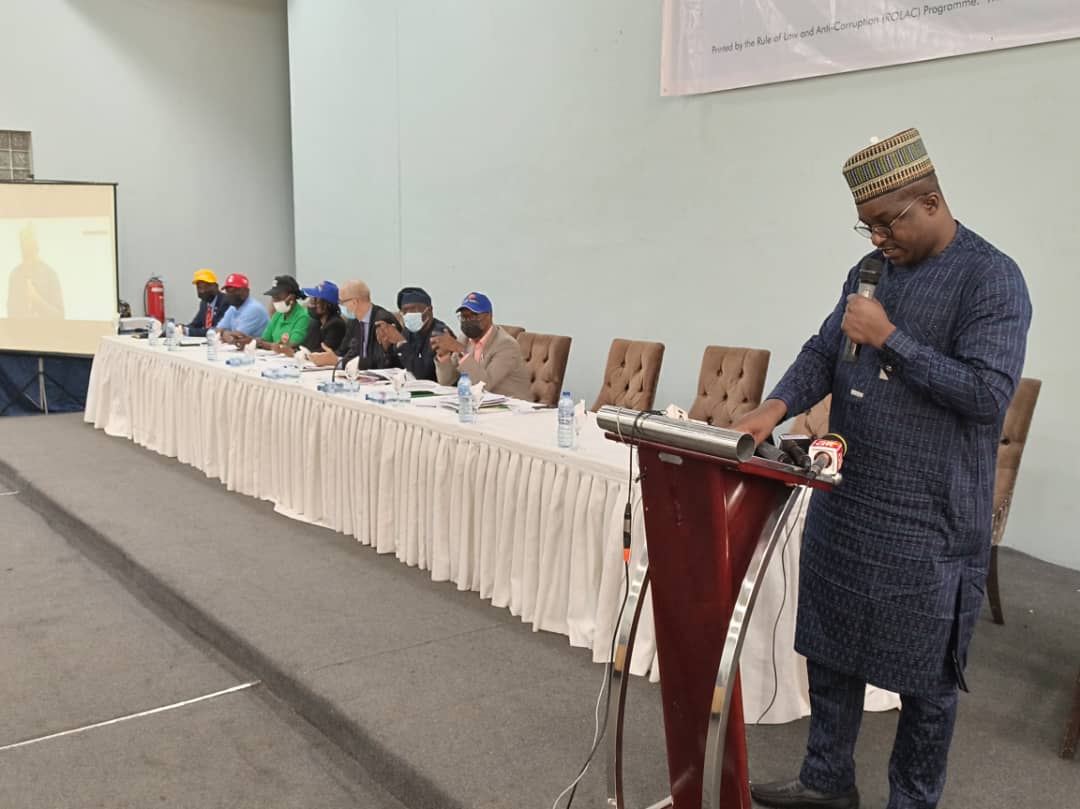The Independent Corrupt Practices and Other Related Offences Commission (ICPC) on 9th December 2021, joined other anti-corruption agencies to mark the International Anti-Corruption Day.
The International Anti-Corruption Day is observed globally on 9th of December of every year to raise awareness about corruption and the ways to combat it. The day seeks to highlight the role of society, individuals, non-governmental organizations, law enforcement agencies, government, and the media in tackling the menace of corruption.
The 2021 edition with the theme, “Your Right, Your Role: Say No to Corruption” was held recently in Abuja.
In her opening remarks, Mrs. Lilian Ekeanyanwu, Head of the Technical Unit on Governance and Anti-corruption Reforms (TUGAR), and head of the Secretariat of the Inter-Agency Task Team of Anti-Corruption Agencies, described the year’s event as very exciting compared to the 2020 celebration that was marred by the outbreak of the Covid-19 pandemic.
She stated that the theme for 2021 sought to have a just society with minimal corruption, good governance, a rancour-free electioneering process, and constitutional democracy.
She stressed that lack of credible elections was part of the major challenges in Nigeria, thus the need to encourage the youths to participate fully in the successful process of choosing the right candidates to govern or be governed as the case may be.
Ekeanyanwu noted further that other strategic approaches for fighting corruption were the implementation of the whistleblower action plan, assets recovery, and beneficial ownership disclosure.
In his welcome address, Barr. Olusegun Adekunle, Chairman of the Nigeria Extractive Industries Transparency Initiative (NEITI), described the fight against corruption as total commitments, adding that the effects of corruption could not be over-emphasized as it undermined development.
He said, “Corruption must be reduced to its minimal. The theme is to draw attention to the right and responsibilities of all to fight corruption in all sectors. The policy, systems, and measures are to ensure that the issue is properly addressed.”
Adekunle said that the National Anti-Corruption Strategy’s action plan (2017-2021) was developed as a mechanism to reduce corruption to a fraction and also establish an ethical standard.
According to him, “The evaluation process and the holistic approach of the Strategy will focus on beneficial ownership disclosure for ensuring accountability and transparency in managing government resources. Nigeria has been at the forefront in assets recovery, illicit financial flows and return of stolen assets.”
Mr. Adekunle further stated that new ways of fighting corruption should be developed, especially the preventive mechanism, while laws should be enforced, ethical code and procedures adequately utilized to reduce corruption in Nigeria.
The Country Representative of the United Nations Office on Drug and Crime (UNODC) Dr. Oliver Stolpe in his message said that the United Nations was assisting countries and communities to address the underlying causes of corruption that was estimated to cost $2.6 trillion annually.
Such assistance also comprised a formidable legal framework which includes arrests, prosecutions, and convictions on daily basis and the return of proceeds of corruption.
He also mentioned that the youth had a role to play by engaging with allies in the fight against corruption and the rule of law to attain sustainable development goals.
In his keynote address, the Honorable Attorney General of the Federation and Minister of Justice, Abubakar Malami, SAN, who spoke virtually expressed his gratitude to the anti-corruption agencies and civil society organizations, and partners in the fight against corruption.
He said that the success of the anti-corruption strategy framework was given a higher priority in their agenda, Nigeria was indeed taking all steps possible in the fight against corruption and robust implementation strategies in the action plan.
He lauded the unconditional support from the public and the development partners in the initiatives of the plan and adoption of beneficial ownership in identifying the proceeds of corruption, noting that it was indeed another milestone in the fight against corruption.
In his goodwill message, the ICPC Chairman Prof. Bolaji Owasanoye, SAN represented by the Secretary to the Commission, Prof. Musa Usman Abubakar, commended the effort of the organizing agencies, while appreciating efforts made on assets recovery across the globe.
Prof. Owasanoye reiterated the functions of ICPC and the successes it had recorded over the years despite the COVID-19 pandemic that affected the socio-economic landscape of Nigeria and the world at large. He listed some of the successes to include the recently concluded National Summit on Diminishing Corruption in the Public Sector.
Thereafter, three discussion panels were formed, and different topics were assigned for discussion. The first panel tackled issues: The National Anti-Corruption Strategy and its Mechanisms- Where are we? The second panel was on “Building an Upright and Value-Oriented Society: the Need for a New Generation of Ethical Leaders in the Electioneering and Governance process”. The last one was “Beneficial Ownership Disclosure: A Tool for Fighting Corruption, Recovery of Assets; Preventing Illicit Financial Flows and Terrorism Financing”.
The second panel discussion was anchored by members of ICPC’s Students Anti-Corruption Vanguards from Baze University, Abuja and Bingham University, Karu, Nasarawa State.

